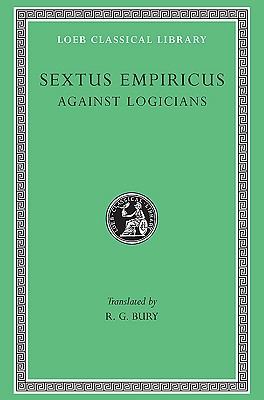

 |

|

The average rating for Sextus Empiricus based on 2 reviews is 4 stars.
Review # 1 was written on 2007-12-19 00:00:00 Hiroki Tsujikami Hiroki TsujikamiI am skeptical that I fully understood this book, but I love the way writers of the past just said what they thought...like it or leave it. |
Review # 2 was written on 2020-12-25 00:00:00 Sonny Wilson Sonny WilsonGetting through this book was a bit of a trial. I can say, though, that now having finished it, this philosophy impressed me even less than Epicureanism did, which doesn't say much for either, but says even less for Pyrrhonism. Pyrrhonism can rightly be called the earliest school of philosophy devoted to skepticism. Now, before atheists wet themselves with glee, Pyrrhonism would have even denied the certitude of the empirical method that today's atheists adore. It really starts with the position that almost nothing is certain; so absolute non-committal is the desired outcome to all inquiry--if inquiry is to be considered beneficial at all, that is. I couldn't help but think of the later philosophy of Descartes and the inane method of Cartesian doubt. It isn't surprising that one of Pascal's labels for Cartesians was Pyrrhonists. Descartes and the Pyrrhonists started with the denial of self-evident truth and believed that that denial was a pretext for a genuine philosophy of first principles. Of course, skepticism has had adherents in others, sometimes it is used constructively and sometimes not; but, as I said in my review of Descartes, a system of skepticism, or doubt, is a contradiction in terms. It is often pointless to even entertain it for any length of time. Basically, though, Pyrrhonism is guilty of the same errors as Cartesianism. Sextus Empiricus was probably the most notable of the Pyrrhonists. With this book he laid out the methods and principles they appeal to when refuting the so-called dogmatists, which include Platonists, Stoics, Peripatetics, Cynics, Epicureans, etc. Pyrrhonism is really a one-trick pony. If you know a few of their methods, you pretty much know how a Pyrrhonist will handle any other philosophy. It is, if nothing else, predictable. I am personally glad it didn't hold much sway in the history of philosophy. Almost no effort would have been made towards understanding the world if it had. One can be glad that many others saw it as intellectually bankrupt. One method of refutation that Sextus Empiricus appeals to regularly is the perpetual aggregate of evidence; namely, that all evidence used to support a claim must also require evidence, and that requires further evidence, and that further evidence… ad infinitum. Since accumulating infinite evidence is absurd (to Empiricus) all evidence used by dogmatists must be rejected. Another of his go-to methods is the lack of agreement between dogmatists. He regularly uses that to show that no dogmatic philosophy is compelling because different schools may claim different and contradictory things. He also denies the state of transition between states, e.g. stasis/motion, learning/teaching, cause/effect, etc, are seen as doubtful because there is no clear state of transition between them. He isn't afraid to use the dogmatists methods as well. With no amount of irony, Sextus Empiricus will even use syllogism to prove syllogism is erroneous. While one might think that Empiricus should either adhere to intelligible or empirical evidence to refute all competing philosophies, he must consistently show both to be doubtful, while at the same time appealing to both! You have to compliment him on his ability to use the methods he claims are dubious. It's almost a kind of philosophical chicanery. The only thing that Empiricus apparently thinks is incontrovertible is the certitude of non-contradiction and the absurdity of perpetual aggregation of evidence. He doesn't explain why in these instances alone we can be certain. If he were consistent, he would not only have to reject those, but also all appeals to syllogistic argument as well. Of course, if he did that, there would be no book and his philosophy would be exposed as the pedantic foolery it is. I will admit to not caring for skeptical philosophy, so I am probably too biased to review this book fairly. I give the book between 2 and 2 and-a-half stars. Some arguments are mildly interesting, but I would say they are few and far between. |
CAN'T FIND WHAT YOU'RE LOOKING FOR? CLICK HERE!!!